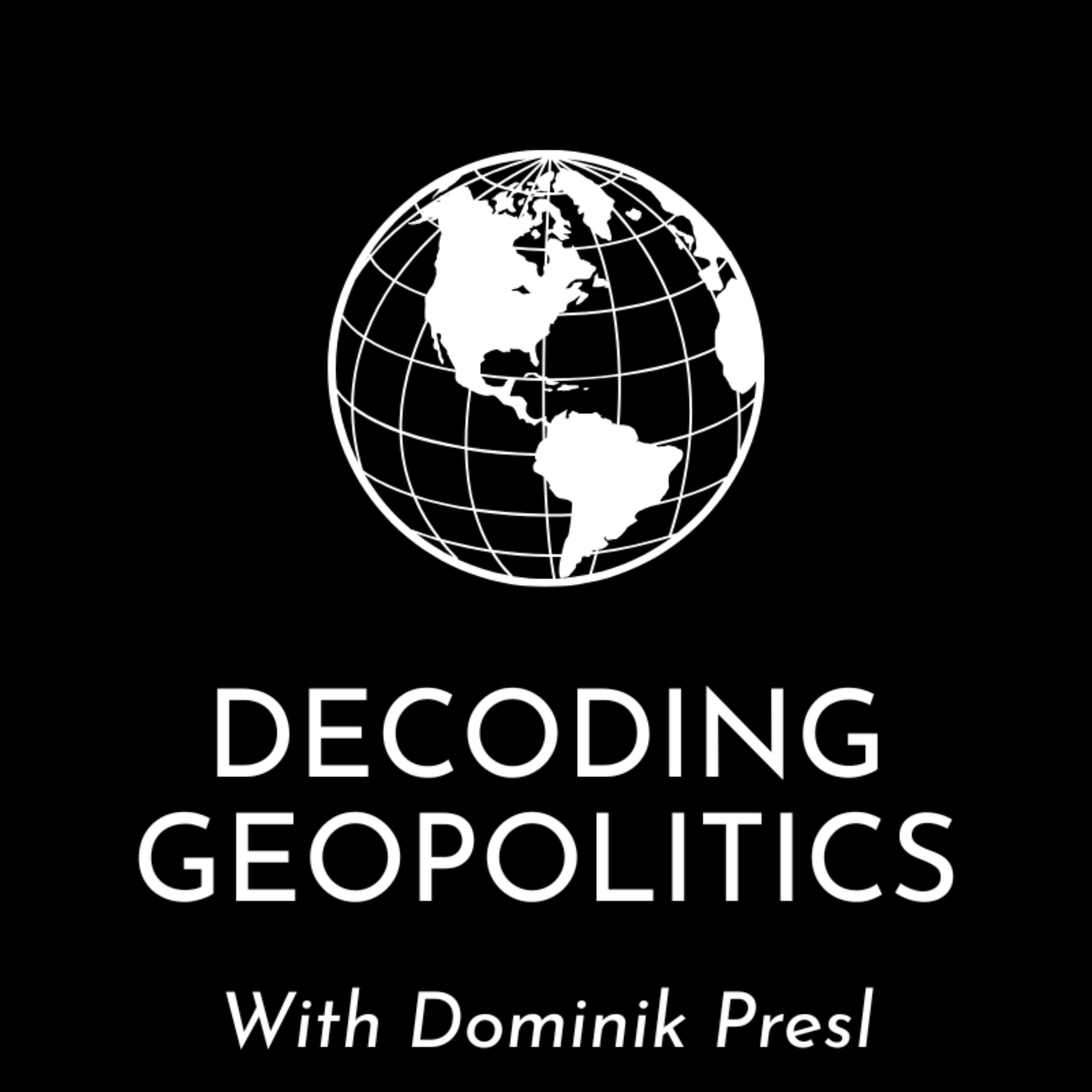

Decoding Geopolitics Podcast with Dominik Presl
Decoding Geopolitics
Decoding Geopolitics is a podcast that tries to make sense of today's dangerous world by talking with real experts on international relations, strategy and security.
Episodes
Mentioned books

Jan 31, 2026 • 35min
#105 Yun Sun: Something Has Changed in Beijing. Xi Believes Now Is His Final Chance on Taiwan
Yun Sun, senior fellow and director of the China Program at the Stimson Center, brings two decades of China expertise. She argues Beijing now sees a narrowing window on Taiwan. Multiple converging factors raise near-term risk. She discusses shifts in Chinese calculus, perceptions of U.S. policy and leadership, and how recent internal PLA changes fit into that picture.

Jan 28, 2026 • 38min
#104 Andrew Monaghan: The West Still Doesn’t See Russia’s Real Plan. Ukraine Is Just the Beginning
Andrew Monaghan, a longtime Russia analyst known for contrarian takes on Moscow’s long-term planning, argues the West misreads Russian strategy. He discusses why Western lenses fail, whether Russia has a grand strategy, maritime and mobilization priorities, geoeconomic goals to 2035, and how Ukraine fits into a broader pattern of Russian statecraft.

Jan 24, 2026 • 38min
#103 Carlo Masala: What if Russia Wins - And NATO Falls Apart?
Carlo Masala, professor of international politics at Bundeswehr University Munich and author of If Russia Wins, outlines a grimly plausible scenario in which Russia tests NATO cohesion. He discusses targeting small border cities, diversion tactics, post-war normalization with Europe, and how political fatigue could reshape security.

Jan 17, 2026 • 41min
#102 Rory Cormac: Coups, Assassinations and Covert Wars Are Back - And the Rules Have Changed
Rory Cormac, a Professor of International Relations at the University of Nottingham, delves into the murky world of covert actions and state-sponsored maneuvers. Discover how nations conduct undercover operations, from the U.S. attempts in Venezuela to Russia's intrusions in Europe. Cormac discusses the paradox of how secrecy often becomes public and the challenges of attributing political outcomes to covert interventions. Historical case studies reveal the complex long-term impacts of these clandestine actions and pose critical questions about their ethical use by democracies.

Jan 10, 2026 • 31min
#101 EU Defence Chief: “We Need a European Army. This Is What Happens If the US Takes Greenland” | Andrius Kubilius
Andrius Kubilius, the first-ever EU Commissioner for Defence and Space, discusses the urgent need for a cohesive European defense strategy. He outlines three pillars for readiness: material, institutional, and political, stressing the importance of reforming Europe's fragmented defense industry. Kubilius argues for a European army amid shifting US focus to the Indo-Pacific and highlights the necessity of replacing US strategic capabilities. He emphasizes growing political will in Europe for stronger self-reliance and the need for dialogue with the US.

8 snips
Jan 3, 2026 • 32min
#100 Olivier Schmitt: Europe’s Security Order Is Breaking Down – And It's Only the Beginning
In this engaging discussion, Olivier Schmitt, head of research at the Danish Defence College and a military strategy expert, examines Europe's precarious security landscape. He outlines the complex interplay of Russian aggression, rising China, and jihadism. Schmitt presents four potential scenarios for Europe's future, hinging on U.S. hostility and European unity. He emphasizes the necessity for Europe to rethink its military strategy and adapt to a reality where dependency on U.S. forces may no longer be viable.

6 snips
Dec 29, 2025 • 40min
#99 Andrew Badger : Inside China’s Epic Campaign To Obtain America’s Secrets
In this discussion with Andrew Badger, a former human intelligence officer and geopolitics lecturer, the focus shifts to China's extensive espionage tactics. He shares insights on how China has skillfully mobilized its citizens and companies to steal advanced technology, fueling rapid economic and military growth. Badger elaborates on civil-military fusion, and the role of global recruitments like the Thousand Talents program. With a deep dive into the implications of these operations, he highlights the West's vulnerabilities and the urgency for countermeasures.

Dec 20, 2025 • 39min
#98 Shashank Joshi: Why America Attacks Europe and Appeases Russia - And Why It’s Only Getting Worse
Shashank Joshi, Chief Defence Editor at The Economist, shares his sharp insights on the controversial 2025 U.S. National Security Strategy. He highlights its unprecedented critique of Europe and the implications of this shift for transatlantic relations. Joshi discusses the document's authorship, mixed internal priorities, and the striking absence of North Korea from the discourse. The conversation challenges listeners to consider how the strategy's aggressive tone towards allies could reshape global alliances and elevate tensions with adversaries like Russia.

6 snips
Dec 13, 2025 • 43min
#97 Steven Everts: Why Europe Is Stuck in a “Psychology of Weakness” - And How to Get Out
In this discussion, Steven Everts, a former EU diplomat and director of the EU Institute for Security Studies, unpacks Europe's 'Psychology of Weakness' and its implications on foreign policy. He critiques the EU's reluctance to engage in diplomacy, emphasizing the need to reclaim agency in negotiations, especially regarding Ukraine. Everts argues for a more assertive European stance against external pressures and outlines practical steps to bolster support for Ukraine, highlighting the importance of unity among member states for effective action.

Dec 6, 2025 • 41min
#96 Chun Han Wong: China Is Entering a New Phase - And Nobody Knows Where It Leads
Chun Han Wong, a Wall Street Journal reporter and author of *Party of One*, shares his insights on China's evolving political landscape. He discusses how Xi Jinping's centralization of power has transformed governance and decision-making within the CCP. Wong explains the consequences of this shift, including the risks of policy paralysis and increasing bureaucracy. He also dives into Xi's motivations, his approach to foreign engagement, and the uncertainties surrounding succession within the party. This in-depth analysis reveals the complexities of China's political future.


